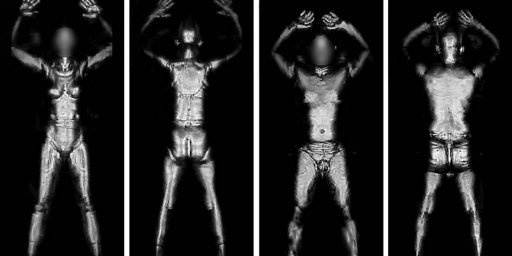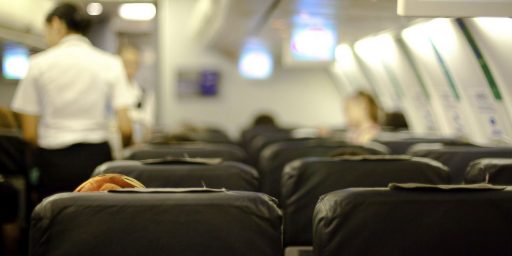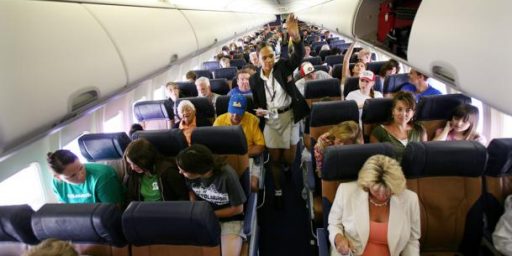TSA to Allow Sharp Objects on Airplanes
The Transportation Security Administration is expected to announce a lifting on the ban of such objects as scissors and cigarette lighters from airplanes, allowing its screeners to focus on explosives and other more dangerous items.
TSA Would Allow Sharp Objects on Airliners (WaPo, A1)
A new plan by the Transportation Security Administration would allow airline passengers to bring scissors and other sharp objects in their carry-on bags because the items no longer pose the greatest threat to airline security, according to sources familiar with the plans.
In a series of briefings this week, TSA Director Edmund S. “Kip” Hawley told aviation industry leaders that he plans to announce changes at airport security checkpoints that would allow scissors less than four inches long and tools, such as screwdrivers, less than seven inches long, according to people familiar with the TSA’s plans. These people spoke on condition of anonymity because the TSA intends to make the plans public Friday.
[…]
The TSA’s internal studies show that carry-on-item screeners spend half of their screening time searching for cigarette lighters, a recently banned item, and that they open 1 out of every 4 bags to remove a pair of scissors, according to sources briefed by the agency. Officials believe that other security measures now in place, such as hardened cockpit doors, would prevent a terrorist from commandeering an aircraft with box cutters or scissors.
[…]
The TSA has been reviewing its list of prohibited items since last summer and has debated whether throwing stars (a martial-arts weapon), ice picks and knives should be allowed back on board, according to TSA documents. In past briefings with reporters, Hawley said the agency was considering other changes that would make the airline security system less predictable. For example, he said that he was unsure whether it makes sense for passengers to routinely remove their shoes at the security checkpoint. He said he also plans to incorporate more bomb-sniffing dogs in airports.
Confiscating scissors and other grooming implements is definitely silly. Still, I can think of no reason that a passenger would need to carry throwing stars and screwdrivers aboard a commercial airliner.
Indeed, if the object of the exercise is to make screening faster and less intrusive, the obvious solution would be to further limit the number of bags passengers are allowed to carry on. This would not only speed security checks but boarding and deplaning as well. Of course, for that to be palatable, airlines would need to figure out how to get checked bags back to passengers more efficiently–preferably without losing them.
Update: Kevin Drum is right about the “histrionic fearmongering” by the flight attendants’ union in the article.
Related:





‘Kevin Drum is right about the “histrionic fearmongering” by the flight attendants’ union in the article.;’
Maybe it’s from the whole throat slitting thing.
Well, initially because of 9/11 they banned nail clippers from airliners. So maybe it was really from the whole involuntary pedicure thing.
Oh, wait…
I’m not so sure the flight attendants are totally wrong in their opposition. In the new security environment, it is the cabin crew that is alone left to manage security while the cockpit crew tries to land the plane. I can certainly understand their unwillingness to put themselves in more potentially dangerous situations with regard to drunk or unruly passengers who just may have one of these sharp objects.
DCL: I don’t disagree with that, although I’d note that passengers were able to carry those items the entire previous history of commerical aviation. And, as Kevin notes, the fact that those brandishing such weapons would not be able to hijack the plane would seem to mitigate against attempts to do so.
Flight attendants are, when it comes down to it, waitresses. We don’t ban people from entering bars and restaurants with scissors.
‘Flight attendants are, when it comes down to it, waitresses. We don’t ban people from entering bars and restaurants with scissors.’
Tell me the next time a terrorist hijacks the corner diner and cuts a few waitresses throats. Also tell me the next time the server at the Outback demonstrates and assists on how to use safety equipment or escorts you to the emergency exit in case of a fire. Could you pssibly be more condescending?
People get shot at bars and restaurants on an all-too-regular basis.
And, sure, flight attendants spent three minutes demonstrating how to put on a seatbelt and an oxygen mask–although some airlines now just show a video instead. Commercial airplanes almost never crash or catch fire. Face it, FAs’ main job is to hand out snacks.
And how is that “condescending”? What’s wrong with being a waitress?
I guess this new rule will not allow anyone employed by the TSA to board any commercial aircraft.
None that I know of are “SHARP”
JJ, I just saw a program last weekend or so (I think it was Dateline or Prime Time or some other magazine program) about the Peruvian 737 that crashed in the Amazon region a month or so ago. A 21 year old FA with injuries to her head got the remaining passengers out of the back of the plane while the front was totally engulfed in flames and smoke. She only got out when she could no longer stay in the wreckage and jumped out into the mud. I think your description of FAs is very condescending, and your life could very well depend on their training and experience if an inflight emergency happens, God forbid. They have a tough job and I don’t begrudge them for it.
I’ll tell you how it’s condescending – no matter how trivial to you – FAs do go thru extensive training and much more is expected of them than waiters or waitresses. Every time I fly I see the same FAs taking tickets, making seat assignments, doing the security checks as I see on the plane.
‘People get shot at bars and restaurants on an all-too-regular basis.’
Having to do with what? Like I said call me when the next terrorist plot involves hijacking the corner diner. I’m sure wearing a short skirt serving shots at the local blood bucket has it’s risks but unless you’re the owner or the bouncer I don’t think it’s part of the job to intervene.
Jack: Noting that restaurants are subject to criminal attack was in response to your clam, “Tell me the next time a terrorist hijacks the corner diner and cuts a few waitresses throats.”
Restaurants are probably as likely to face a terrorist attack as airplanes, if not more so. See, for example, Car bomb hits Karachi restaurant.
Moreover, while I don’t deny that FAs have somewhat more training and theoretical responsibility than restaurant servers, I would note that their jobs are virtually the same on a day-to-day basis:
And it’s not like the flight crews disabled the hijackers on 9/11.
‘Restaurants are probably as likely to face a terrorist attack as airplanes, if not more so. See, for example, Car bomb hits Karachi restaurant.’
And the waitresses were the targets?
‘I would note that their jobs are virtually the same on a day-to-day basis:
‘However, only a few flights ever require an emergency response. On most flights, attendants follow the same routine.’
On most days police officers shuffle papers, take phone calls and look at computers. Few are ever invovled in emergency situations. So their job is essentially the same as an office clerk.
Jack: On most days police officers shuffle papers, take phone calls and look at computers. Few are ever invovled in emergency situations. So their job is essentially the same as an office clerk.
That’s pretty much true of supervisors who don’t go out in the field. Neither the proposition or the conclusion are true of patrolmen.
The idea that FAs are “first responders” or “emergency personnel” is a post-911 fiction. Indeed, if it were true, the airlines would be quite derelict in hiring the obese, the old, and tiny women as the modal worker and dressing them in skirts and heels. If their main job is to deal with emergencies, then we should be hiring the same kind of people we employ as soldiers and cops. We don’t for a reason: Their main job is passing out snacks.
‘That’s pretty much true of supervisors who don’t go out in the field. Neither the proposition or the conclusion are true of patrolmen.’
I live in a big East Coast city
Q: What % of officers are involved in a felony arrest in any given year
A: 3%
I’m not saying that being a police officer is the same as being an office clerk and if you misinterpreted my comment that way it’s because I wasn’t expansive enough, cyber slacking and all that. What I’m trying to convey is that there’s no reason to denigrate the job training of FAs because they don’t need to do CPR on every flight or alert the FAA to arrest abusive passengers.
Are they first responders,no, they’re not waitresses either. Especially the guy ones. You deserve to get coffee spilled on you on your next flight though.
It’s true most cops don’t arrest murderers on any regular basis. Still, it helps illustrate the difference between their job and a flight attendant’s.
Look on the website of any airline or just Google around and look for information about flight attendant training. The emphasis is universally on lots of days off, travel to exotic places, and the like. There is no pitch about “help fight terrorists: or “rescue people from burning planes.” By contrast, while the day-to-day existence of the average beat cop is pretty mundane, the attraction to the job and the emphasis of the training is the dangerous aspect.
Again, none of this is to denigrate the FAs. They aren’t recruited or selected based on the emergency aspect of their duties. But, again, if that was really even a significant portion of their job, one would think the average FA would be a 6 foot, 185 pound man rather than a 5-5, 135 pound woman.